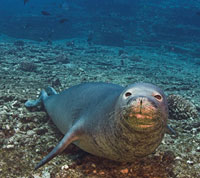|
Threats in Turkey:
A region suffering from uncontrolled development and overfishing:
Turkey's western and southern coast forms part of the coastline of the Mediterranean Sea. The area of the Mediterranean bounded by Turkey to the east, mainland Greece to the west, and the island of Crete to the south is known as the Aegean Sea.
Rich in biodiversity
The Mediterranean Sea supports a wide range of marine life, and has the world's second highest percentage of endemic species. Animals living in Turkey's waters include the endangered Mediterranean monk seal (Monachus monachus), green turtle (Chelonia mydas), loggerhead turtle (Caretta caretta), bottlenose dolphin (Tursiops truncatus), striped dolphin (Stenella coeruleoalba), and short-beaked common dolphin (Delphinus delphis), as well as many crustacean and fish species.
Dalmatian pelicans nesting in the Menderes Delta, Aegean Sea, Turkey.
Meadows of the endemic Mediterranean seagrass Posidonia oceanica are also found in Turkey. These underwater meadows provide important breeding, feeding, and resting areas for fish, crustaceans, and marine turtles.
They produce more than 80 per cent of the annual fish yield in the Mediterranean Sea, and also stabilize the seashore and maintain water quality, particularly through oxygen production.
Many bird species live or winter on the Mediterranean coast, deltas, and offshore islands. These include shag (Phalacrocorax aristotelis desmarestii), kestrel (Falco tinnunculus), lesser kestrel (F. naumanni), peregrine (F. peregrinus), tern (Sterna hirundo), little tern (S. albifrons), shelduck (Tadorna tadorna), ruddy shelduck (T. ferrugunea), and Dalmatian pelican (Pelecanus crispus).
Rabbits, rodents, and partridges living on islands attract birds living in forested areas on the mainland, such as the long-legged buzzard (Buteo ruffinus) and eagle owl (Bubo bubo). Foça, on the Outer Gulf of Izmir in the Aegean Sea and one of SAD-AFAG's project sites, is
classified as an Important Bird Area.
The Mediterranean Sea is one of WWF's Global 200 Ecoregions - a science-based global ranking of the world's most biologically outstanding habitats and the regions on which WWF concentrates its efforts.
Critical habitat for the monk seal
Turkey's rocky coastline provides critical habitat for the endangered Mediterranean monk seal. Around 100 monk seals are found in Turkey. The rocks also provide a solid substrate for algae and invertebrates like corals, molluscs, and crustaceans, as well as refuge, feeding, and spawning grounds for many species of fish and invertebrates.
The large nets of industrial trawlers catch everything in their path.
Although the majority of Turkey's fishing industry is focused on the Black Sea, the Aegean and Mediterranean Seas are important fisheries for the country, particularly for local artisanal fishermen - locals who set a small number of nets to supply themselves and their town with fish. In some places, the inshore area is reserved for artisanal fishermen.
Industrial fleets also fish in the Turkey's Mediterranean waters. Trawlers are not supposed to come closer than 1.5-2 miles from shore, and purse seine vessels - which lower a large net onto a school of fish and then pull it shut from beneath like a drawstring purse - are not supposed to fish in water shallower than 18m. However, these restrictions are often broken.
As in other parts of the Mediterranean, Turkey's coastal habitats are threatened by development and intensive tourism. Pollution, such as effluent from domestic and industrial sources, oil transportation and refineries, and agricultural runoff, is also a growing threat.
Overfishing is a major problem, affecting both wildlife and local artisanal fishermen. The main culprits are industrial trawlers and purse seine vessels, which form the largest fishing fleet in Turkey.
The huge trawling and purse seine nets, which indiscriminately catch everything that crosses their path, have fished out deeper waters. Over the past 20 years the boats have - often illegally - come closer and closer to shore, and have now fished out inshore areas as well.
Seals and fishermen: coming into conflict
As a consequence of overfishing by industrial fleets, many local fisheries are declining. With fewer fish to go around, local fishermen and Mediterranean monk seals have increasingly come into conflict over the same limited food supply.
There is preliminary evidence indicating that the seals may be suffering from starvation and reduced breeding success. Some fishermen kill the seals in retaliation for 'stealing' fish from their nets. And the fishermen too are suffering as their livelihood disappears.
But ironically, this competition is now helping both to survive. The fishermen are becoming 'guardians of the monk seals', and in doing so, are improving their livelihoods by bringing the fish back to their waters. Find out more!
http://www.sosflorestas.com.br/about_wwf/where_we_work/europe/what_we_do/mediterranean/about/marine/monk_seal_project/area/index.cfm

|

